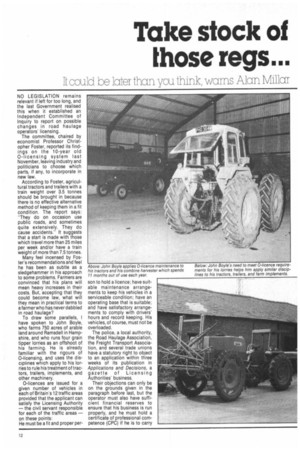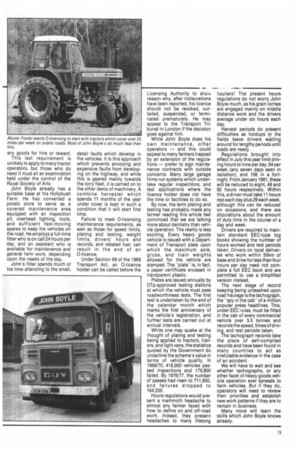Take stock of those regs...
Page 128

Page 129

If you've noticed an error in this article please click here to report it so we can fix it.
IL could oe later t non yoL thi K, war ris Alan Villa'
NO LEGISLATION remains relevant if left for too long, and the last Government realised this when it established an Independent Committee of Inquiry to report on possible changes in road haulage operators licensing.
The committee, chaired by economist Professor Christopher Foster, reported its findings on the 10-year old 0-licensing system last November, leaving industry and politicians to choose which parts, if any, to incorporate in new law.
According to Foster, agricultural tractors and trailers with a train weight over 3.5 tonnes should be brought in because there is no effective alternative method of keeping them in a fit condition. The report says: "They do on occasion use public roads, and sometimes quite extensively. They do cause accidents.It suggests that a start is made with those which travel more than 25 miles per week and/or have a train weight of more than 7.5 tonnes.
Many feel incensed by Foster's recommendations and feel he has been as subtle as a sledgehammer in his approach to some problems. Farmers are convinced that his plans will mean heavy increases in their costs. But, accepting that they could become law, what will they mean in practical terms to a farmer who has never dabbled in road haulage?
To draw some parallels, I have spoken to John Boyle, who farms 750 acres of arable land around Ramsdell in Hampshire, and who runs four grain tipper lorries as an offshoot of his farming. He is already familiar with the rigours of 0-licensing, and uses the disciplines which apply to his lorries to rule his treatment of tractors, trailers, implements, and other machinery.
0-licences are issued for a given number of vehicles in each of Britain's 12 traffic areas provided that the applicant can satisfy the Licensing Authority — the civil servant responsible for each of the traffic areas — on these points: He must be a fit and proper per son to hold a licence; have suitable maintenance arrangements to keep his vehicles in a serviceable condition; have an operating base that is suitable: and have satisfactory arrangements to comply with drivers' hours and record keeping. His vehicles, of course, must not be overloaded.
The police, a local authority, the Road Haulage Association, the Freight Transport Association, and several trade unions have a statutory right to object to an application within three weeks of its publication in Applications and Decisions, a gazette of Licensing Authorities' business.
Their objections can only be on the grounds given in the paragraph before last, but the operator must also have sufficient financial reserves to ensure that his business is run properly, and he must hold a certificate of professional competence (CPC) if he is to carry any goods for hire or reward.
This last requirement is unlikely to apply to many tractor operators, but those who do need it must sit an examination held under the control of the Royal Society of Arts.
John Boyle already has a suitable base at his Hollybush Farm. He has converted a potato store to serve as a covered maintenance area equipped with an inspection pit, overhead lighting, tools, and sufficient fast-moving spares to keep his vehicles on the road. He employs a full-time fitter who is on call 24 hours per day, and an assistant who is available for maintenance and general farm work, depending upon the needs of the day.
John's fitter spends much ot his time attending to the small, detail faults which develop in the vehicles, It is this approach which prevents annoying and expensive faults from developing on the highway, and while this is geared mainly towards the lorry fleet, it is carried on to the other items of machinery. A combine harvester which spends 11 months of the year under cover is kept in such a condition that it will start first time.
Failure to meet 0-licensing maintenance requirements. as weir as those for speed limits, plating and testing, weight limits, drivers' hours and records, and rebated fuel, can result in the end of an 0-licence.
Under Section 69 of the 1968 Transport Act, an 0-licence holder can be called before the Licensing Authority to shoiiiiv reason why, after indiscretions have been reported, his licence should not be revoked, curtailed, suspended, or terminated prematurely. He may appeal to the Transport Tribunal in London if the decision goes against him.
While John Boyle does his own maintenance, other operators — and this could appeal to many farmers trapped by an extension of the regulations — prefer to sign maintenance contracts with outside concerns. Many large garage firms run systems which undertake regular inspections, and test applications where the licence holder does not have the time or facilities to do so.
By now, the term plating and testing has probably made any farmer reading this article feel convinced that we are talking more about dentistry than vehicle operation. The reality is less exciting. Every heavy goods vehicle is issued with a Department of Transport plate upon which the maximum axle, gross, and train weights allowed for the vehicle are stamped. The 'plate.' is, in fact, a paper certificate encased in transparent plastic.
Plates are issuedannually by DTp-approved testing stations at which the vehicle must pass roadworthiness tests. The first test is undertaken by the end of the calendar month which marks the first anniversary of the vehicle's registration, and further tests are carried out at annual intervals.
While one may quake at the thought of plating and testing being applied to tractors, trailers, and light vans, the statistics quoted by the Government do underline the scheme's value in terms of vehicle quality. In 1969/70, 418,900 vehicles passed inspections and 179,800 failed. By 1976/77, the number of passes had risen to 711,600, and failures dropped to 164,200.
Hours regulations would present a mammoth headache to almost any farmer faced with how to define on and off-road work. Indeed, they present headaches to many lifelong hauliers! The present hours regulations do not worry John Boyle much, as his grain lorries are engaged mainly on middle distance work and the drivers average under six hours each day.
Harvest periods do present difficulties as holdups in the fields leave drivers waiting around for lengthy periods until loads are ready.
Regulations brought into effect in July this year limit driving hours to nine perday, 54 per week (any seven days seen in isolation), and 106 in a fortnight, From January 1981, these will be reduced to eight, 48 and 92 hours respectively. Within this, a driver must take 11 hours rest each day plus 29 each week, although this can be reduced on occasions, and there are stipulations about the amount of duty time in the course of a day and week.
Drivers are required to maintain standard EEC-type log books showing the number of hours worked and rest periods taken. Drivers or local deliveries who work within 50km of base and drive for less than four hours per day need not complete a full EEC bock and are permitted to use a simplified version instead.
The next stage of record keeping being unleashed upon road haulage is the tachograph, the "spy in the cab'. of a million popular press headlines. This, under EEC rules, must be fitted in the cab of every commercial vehicle over 3.5 tonnes and records the speed, times of driving, and rest periods taken.
The tachograph records take the place of self-compiled records and have been found in many countries to act as irrefutable evidence in the case of an accident.
We will have to wait and see whether tachographs, or any other facet of heavy goods vehicle operation ever spreads to farm vehicles. But if they do, operators will need to review their priorities and establish new work patterns if they are to remain in business.
Many more will learn the skills which John Boyle knows already.




























































































































































